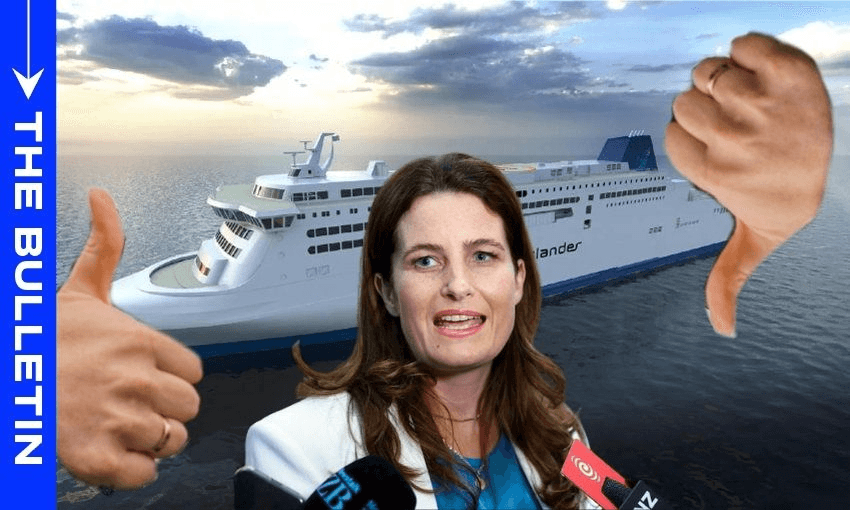The wait for replacement Interislander ferries will drag on until 2029, as ministers reveal a plan to buy two smaller ships, reports Joel MacManus reports from parliament.
To receive The Bulletin in full each weekday, sign up here.
Crown company created to procure two new Interislander ferries by 2029
The long-awaited drama about the new Interislander ferries reached a pivotal moment on Wednesday when finance minister Nicola Willis and newly appointed minister for rail Winston Peters held a press conference titled “ferries announcement” in the Beehive Theatrette. The two ministers revealed that the government had created a new Schedule 4A Crown company to procure two new Interislander ferries by 2029. As 1News reported, shareholding ministers of the new company would be the minister for rail and the ministers of finance and transport. Peters would also take on the responsibility formerly held by the Minister of SOEs for KiwiRail and NZ Railways Corporation. As RNZ’s Russell Palmer reports, Labour leader Chris Hipkins described it as “an announcement of an announcement”.
Precious little detail
Willis and Peters wouldn’t say how much the ferries would cost or whether they would be rail-enabled. Willis said a funding envelope has been established, that the costs are expected to be much less than would have been the case with Project iRex but that they were commercially confidential until procurement and negotiations for landside infrastructure were completed. The projected costs of Project iRex had escalated from $775m to $3.2bn, mostly due to the landside upgrades that would be required to handle the larger ships.
The government is still open to alternative pitches from the private sector and the idea that the ferries could be operated by an entity other than KiwiRail. The new ferries will be purpose-built; Willis confirmed that the government had looked into buying secondhand ferries, but there were no suitable ships on the market. The Herald’s Georgina Campbell did not mince her words (paywalled) on the lack of detail, writing, “It makes one wonder what on earth the government has been doing for the past year, especially because even these vague details aren’t set in concrete”.
This morning, The Post’s Luke Malpass describes handing the project over to Peters while retaining the option to receive pitches from the private sector, which keeps the Act party happy, as having a certain political elegance to it. But, he writes “it does have the downside for the government of creating a political vacuum on the issue for many more months.”
Opposition ‘astounded’, ‘disgusted’ over ‘omnishambles’
Cancelling the iRex contract early into her government’s term was a chance for Willis to put the hammer down and send a clear signal that hers would be a cost-cutting government that wasn’t afraid to make hard choices. With news of an expensive break-contract fee and more high-profile incidents of the current Interislander ferries breaking down, questioning about the wisdom of that decision hasn’t abated. In an opinion piece for Newsroom in August, Carl Findlay, National Secretary of the Maritime Union of New Zealand, wrote, “Ever seen someone lose a billion dollars on a single roll of the dice?”
Following yesterday’s announcement, Act leader David Seymour claimed the cost was “approximately half the cost of Labour’s proposal”. Peters would not say how much the new ships might cost but called Seymour’s comments inaccurate and unhelpful, RNZ reported.
Labour’s finance spokesperson Barbara Edmonds said it would end up costing more. “[Willis] has taken a whole year to come up with smaller ferries that are going to cost the country more money in the long run. The portside infrastructure will still have to be built, she’s just burdening future New Zealanders with the cost,” Edmonds said.
Hipkins said he was “astounded” that after a year, there was still “no more information about what they’re actually going to do”.
Green party transport spokesperson Julie Anne Genter said the Hyundai order for two rail-enabled ferries for $550m was “one of the best deals the country ever signed up to” and emphasised that this new deal meant the new ferries would arrive in 2029 rather than 2026. Genter described Willis’s decision as “catastrophic” and said she thought it was an “omnishambles”.
The obvious question now is what kind of ferries the government will be able to find and how much money it will save relative to Project iRex. Given the amount of money already spent on the Hyundai ferries and the cost of breaking the contract, it will have to be a significantly cheaper deal overall to still make the numbers work. Willis and Peters seemed confident they could make it happen.
Timeline to date
- November 2018 – KiwiRail completes a business case indicating a preference for two rail-enabled ships, a total project cost of $775m.
- November 2019 – KiwiRail submits a budget bid for $682m, estimating the total costs to reach $1.4 billion.
- May 2020 – The Labour government allocates $400m in Budget 2020.
- January 2021 – KiwiRail submits another budget bid, this time for $565m.
- June 2021 – KiwiRail enters into a fixed-price contract with Hyundai Mipo Dockyard to construct two ferries, which will be delivered in 2025 and 2026.
- October 2022 – It becomes clear that the port infrastructure costs associated with the project are escalating in cost and pose a risk of failure.
- February 2023 – Updated estimates put the project’s cost at $2.6bn. KiwiRail submits a bid for $1.2bn in Crown funding, triggering a series of reviews and updates.
- December 2023 – Nicola Willis announces that Cabinet has declined to fund the iRex project due to cost blowouts and the likelihood of future repeats.
- February 2024 – The government appoints a ferry ministerial advisory group to investigate options and advise on what would make a viable ferry service.
- November 2024 – Willis and Peters announce a new procurement process for two smaller ferries.
